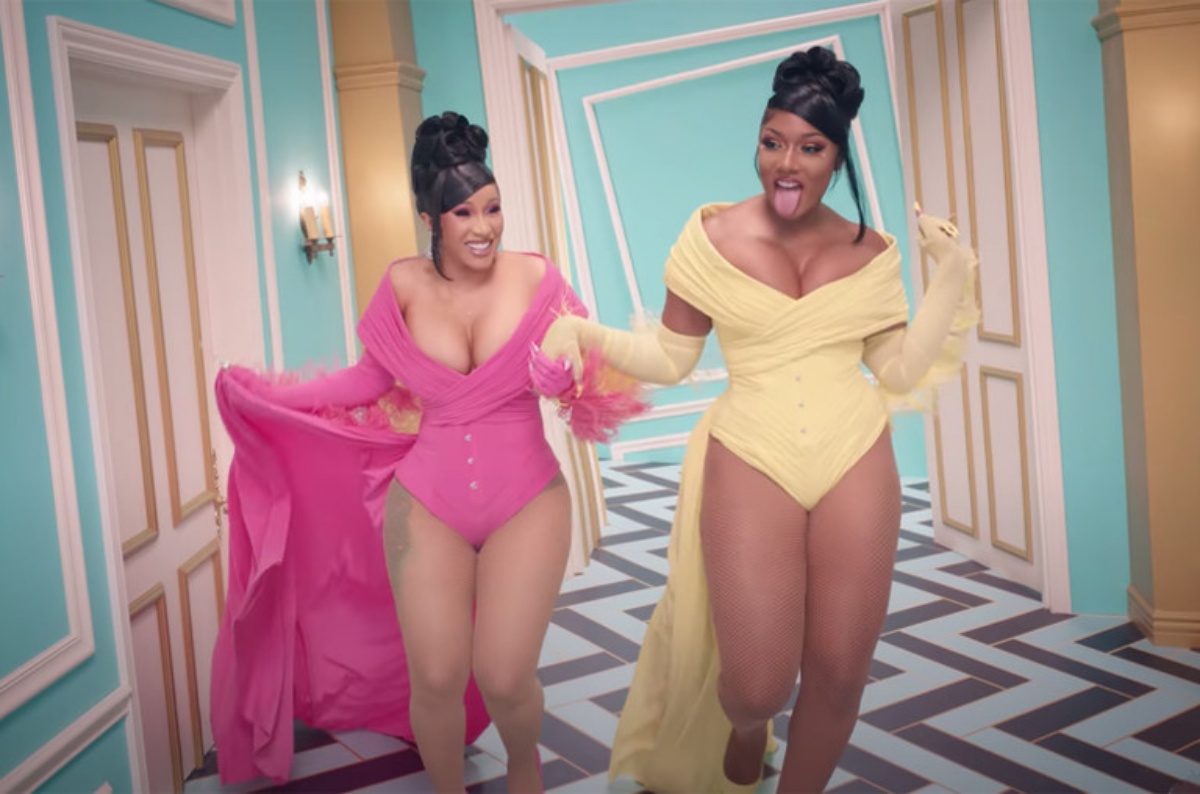The Complex Sexual Politics of “WAP” & the Freedom to Be Sexy and Black

The new music video starring Cardi B and featuring Megan Thee Stallion,”WAP,” has been such a moment in our pop culture history that even politicians are commenting on it.
In their 2020 hit song “WAP” (meaning “wet ass pussy” or “wet and gushy” if you are listening to the “clean” radio version), Cardi B and Megan have brought up a discourse that has been happening in female rap since Lil’ Kim squatted back in the ’90s. How much of this sexuality is done with female autonomy and how much of it is rooted in the male gaze? Does it matter? And how do we discuss this without invalidating that as artists, these women should be able to write about whatever they want?
Sex is a part of music regardless of genre. Rap, however, always gets a laser focus because it can certainly be more explicit and is more raunchy than a lot of modern genres. BET at night delivered videos that were infamous in the way it hyper-sexualized Black women. Rap is a male-dominated industry and women have often struggled to be respected the way that they deserve.
If they are a talented rapper, but come in through a group and are a sexual woman, it is assumed that a man wrote their raps (Lil’ Kim). Dark skinned women are not as popular in the industry and the majority of mainstream rap that you hear from female rappers is very sexual in tone. While there are some exceptions like Missy Elliot, I think people often de-sexualize her music and ignore that Missy is also talking about her WAP in songs plenty too.
Joan Morgan wrote “When Chickenheads Come Home to Roost” in 1999 and it became an important Black feminist text that discussed what hip-hop meant to us Black women, despite the sexism in the industry.
“We need a feminism that possesses the same fundamental understanding held by any true student of hiphop. Truth can’t be found in the voice of any one rapper but in the juxtaposition of many. The keys that unlock the riches of contemporary black female identity lie not in choosing Latifah over Lil’ Kim, or even Foxy Brown over Salt-N-Pepa. They lie at the magical intersection where those contrary voices meet—the juncture where “truth” is no longer black and white but subtle, intriguing shades of gray.”
Black women are forced to grow up fast because at a young age we are perceived to be women. Sexuality is forced onto us and we are given only two options at the time: “lean into it or run away from it.” It isn’t until later that we are able to see the binary for what it is. A trap.
For many what female hip-hop does, when it is nasty and talking about what we want, is that it puts us first. We get to own our pleasure in those 3 minutes and it feels good to have that for a moment. Because that illusion of sexual control and autonomy in a song can be affirming.
Mikki Kendall says in “Hood Feminism” that:
“For young Black American girls there is no presumption of innocence by people outside our communities, and too many inside our communities have bought into the victim-blaming ideology that respectability will save us, not acknowledging that we are so often targeted regardless of how we behave. The cycle created by racist narratives and perpetuated by the myth of the fast-tailed girl is infinitely harmful and so difficult to break, precisely because of the ugly history of sexual violence against Black women and other women of color.”
There is something that feels good about hearing two Black women talk about wanting to get what they want from sex. That someone like Cardi B, who has never lost her thick accent, her long nails, or ratchet personality has managed to be a success. She is everything that our parents told us would mark us for failure and even though I doubt Cardi would get away with this as much if she were a darker-skinned woman, I still see the ignorant, racist comments she gets.
What is also missing from the “WAP” conversation is how great it was to see two female rappers collab in more than just a verse. It was more than just a song and Megan is currently the “it girl” of rap. She’s talented, gorgeous, and Cardi put them in a song as equals. This marks a huge difference from the years where there could only be one female rapper who could be successful.
Megan has collaborated with Cardi B, Nicki Minaj, Beyoncé, and others proving that women in rap are undoubtedly stronger together.
With all that on the table, we can also say that female rappers have been shoved into spaces where sex is what sells. All of the rappers and artists I’ve mentioned have songs talking about abortion, love, their insecurities, death, etc., but those are not the songs most people think about when they come up in conversation.
Rap has always monetized Black women’s bodies and that isn’t changing. There are plenty of Black female artists and Black queer artists who do not get as much play because they do not fall into the gaze. That is a problem. We need more music that broadens the sexuality of Black women without cishet men.
But the problem in that situation isn’t Cardi B and Megan. It’s an industry that has decided that Black women can only fit into this narrow place. They are doing their part to change it by collaborating with other women across different genres. It is the mainstream’s job to listen.
(image: Atlantic Records)
Want more stories like this? Become a subscriber and support the site!
—The Mary Sue has a strict comment policy that forbids, but is not limited to, personal insults toward anyone, hate speech, and trolling.—
Have a tip we should know? tips@themarysue.com